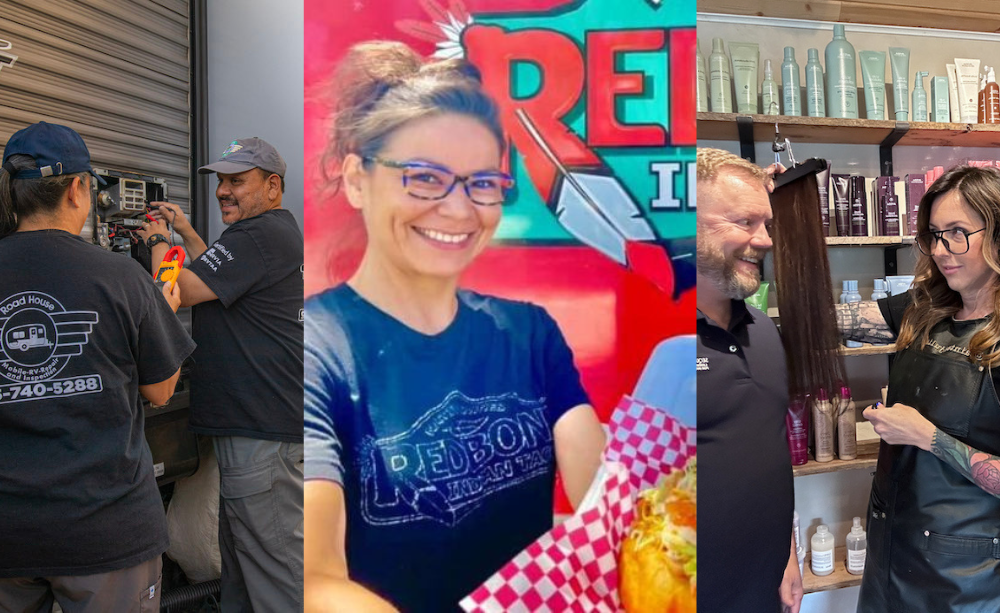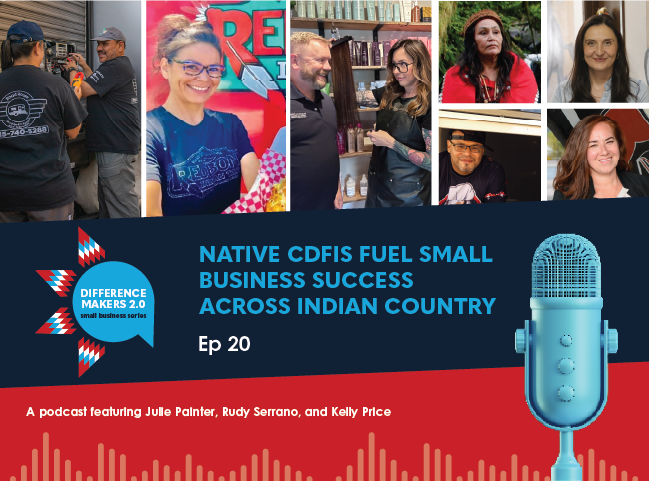
- Details
- By Native StoryLab
- Sponsored Content
Throughout this season of "Difference Makers 2.0," listeners journeyed across Indian Country to meet Native entrepreneurs who transformed their dreams into thriving businesses. From Winnebago chef Reggie Frazier's restaurant and food truck venture to Tlingit elder John Hillman's wilderness tour operation and Tulalip Nation citizen Anthony Henry's commercial fishing enterprise, each story shared common threads: overcoming significant barriers and finding crucial support through Native Community Development Financial Institutions (CDFIs).
In the season finale, host Elyse Wild returned to check on several featured business owners nearly a year after their original interviews. The conversations revealed stories of growth, resilience in the face of unexpected challenges, and the continuing impact of Native CDFIs in fostering economic development across Indigenous communities.
Julie Painter, a member of the Eastern Band of Cherokee Indians and owner of Visage Salon, faced one of her biggest challenges yet when Hurricane Helene devastated western North Carolina. The storm flooded her salon, forcing a three-week closure while she and her team literally shoveled mud from the building and cleared debris with tractors.
"It was so apocalyptic," Painter recalled, describing how all cell service went down during the storm's peak, leaving the community completely cut off from the outside world. The uncertainty was terrifying, but the recovery phase highlighted the strength of both the beauty industry community and her Native CDFI support system.
When government funding for small business recovery proved slow or unavailable, Native CDFIs stepped in to fill the gap. Painter, who serves on the board of the Sequoia Fund, emphasized how crucial these institutions are for businesses that lack other funding sources for repairs and recovery.
The salon community rallied together in impressive ways. Fellow business owners offered free workspace, companies donated products and tools, and networks spread the word about businesses in need. "The beauty community in western North Carolina really came together," Painter noted, describing offers of furniture, equipment, and collaborative support that helped everyone get back on their feet.
Business Growth and Expansion
Meanwhile, in Texas, Rudy Serrano's RV repair service has experienced explosive growth. After launching his business with help from Tigua Community Development Corporation, Serrano reported that his operation has nearly tripled in size since the previous interview.
"I don't know if it's the summer or my efforts to get my company name out there, but it has been crazy busy," Serrano said. The former paralegal, who spent two decades in that field before pursuing his entrepreneurial dreams, now handles such high volume that he's actively seeking to hire additional help.
Part of his success comes from strategic partnerships. Serrano has become certified through major RV industry vendors like Furion and Firefly, allowing him to perform authorized service work. This certification has been particularly valuable during the summer months when air conditioning repairs are in high demand.
His business expansion has also enabled the lifestyle he originally sought—traveling while working. Serrano's service area has grown from just El Paso to include destinations throughout New Mexico, West Texas, and South Texas. He and his wife are planning a trip to California's West Coast, including Yosemite and Morro Bay.
From Food Truck to Brick-and-Mortar Success
Kelly Price's journey with Red Bone Indian Tacos represents another success story of patient growth and strategic expansion. With support from the Citizen Potawatomi Community Development Corporation, Price transformed her grandmother's fry bread recipe into a thriving food business.
After years of operating solely as a food truck, Price successfully opened a brick-and-mortar location in Lawton, Oklahoma, on April Fool's Day. The transition wasn't without challenges—converting a former drive-through snow cone stand required extensive renovation, from clearing out previous equipment to installing proper plumbing, vent hoods, and grease traps.
The permanent location has transformed her business model. Operating Monday through Friday from 11 AM to 9 PM, the restaurant provides a steady daily income while the food truck continues serving weekend events and catering jobs. The larger commissary space and equipment make food truck operations more efficient for big events.
Price's son has stepped into a management role, making it truly a family business. Their success has gained recognition beyond their community—they were selected by the Oklahoma Youth Council for a True Story Films commercial, one of only three businesses chosen nationwide for the program.
The Broader Impact
These individual success stories illustrate the broader mission of Native CDFIs in Indian Country. Every featured entrepreneur this season faced common barriers: limited access to capital, lack of credit-building opportunities, predatory lenders, insufficient business education, and bureaucratic obstacles.
Native CDFIs have proven instrumental in helping entrepreneurs overcome these systemic challenges. From Hurricane Helene recovery funds to initial startup capital, these institutions provide crucial financial support that mainstream banks often cannot or will not offer in Native communities.
As Native CDFI Network CEO Pete Upton at last year's NCN Summit, "You can't have a community without small businesses." Each success story creates ripple effects—jobs created, wealth built, homes owned, and communities strengthened. The small business owners featured on Difference Makers 2.0 represent more than individual achievement; they embody the resilience and determination that drive economic development in Indian Country, supported by financial institutions that understand both the challenges and the potential of Native communities.
